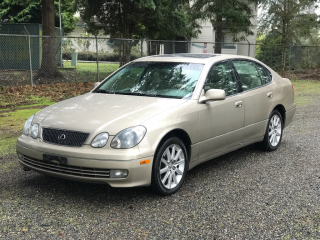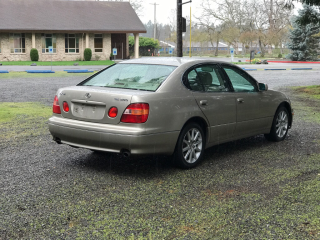The 1999 Lexus GS 300 is a luxury sedan that bridged the gap between sportiness and comfort. Part of the second generation (S160) introduced in 1997, it remained in production until 2005. Available in a single, well-equipped trim, its popularity stemmed from its refined engineering, smooth V6 engine, and the renowned Lexus reliability, all offered at a competitive price point for a premium vehicle.
The Good
The 1999 GS 300 boasts a silky-smooth V6 engine offering ample power, legendary Lexus reliability for peace of mind, a comfortable and quiet cabin, and an elegant, understated design. It presents excellent value, combining luxury with practicality for discerning buyers.
The Bad
Potential buyers of the 1999 Lexus GS 300 should watch out for aging electronic components, particularly the immobilizer system. Transmission issues, though not widespread, can occur. Interior wear, especially on leather and wood trim, is common in higher-mileage examples.
1999 Lexus GS 300: Quick Overview
- Engine Options:
- 3.0L DOHC 24-valve VVT-i V6 (2JZ-GE)
- Horsepower: 220 hp @ 5800 rpm
- Torque: 225 lb-ft @ 3800 rpm
- Fuel Economy (EPA Estimated):
- City: 17 mpg
- Highway: 23 mpg
- 0-60 Times: Approximately 7.4 - 8.0 seconds (depending on driver and conditions)
- Towing Capacity: Not applicable (sedan)
- Trim-Level Features (Standard on GS 300):
- 5-speed automatic transmission
- Rear-wheel drive (RWD)
- Leather upholstery
- Power adjustable front seats with driver's memory
- Automatic climate control
- Power windows, locks, and mirrors
- Cruise control
- Premium ETR AM/FM stereo with cassette and CD player
- Anti-lock Braking System (ABS)
- Traction Control System (TCS)
- Driver and front passenger airbags
- Side airbags (optional)
- Sunroof (optional)
- High-intensity discharge (HID) headlights (optional)
- Navigation system (optional)
- Vehicle Speed-Sensitive Power Steering
- 17-inch alloy wheels
1999 Lexus GS 300 Specifications
Vehicle Information
| Year | 1999 |
| Make | Lexus |
| Model | GS 300 |
| Trim | - |
| Style | - |
| Type | Sedan |
| Category | Mid-Size Car |
Manufacturing Details
| Made In | Japan |
| Manufacturing City | TAHARA |
Dimensions
| Doors | 4-Door |
| Curb Weight | 1650.17 kg |
| Gross Vehicle Weight Rating | 2267.96 kg |
| Overall Height | 141.99 cm |
| Overall Length | 480.57 cm |
| Overall Width | 180.09 cm |
| Wheelbase Length | 279.91 cm |
| Standard Seating | 5 |
Engine & Performance
| Engine | 3.0L L6 DOHC 24V |
| Engine Size | 3L |
| Engine Cylinders | 6 |
| Transmission | 5-Speed Automatic |
| Transmission Type | Automatic |
| Transmission Speeds | 5-Speed |
| Drivetrain | Rear-Wheel Drive |
Additional Features
| Anti-Brake System | 4-Wheel ABS |
| Steering Type | Rack & Pinion |
Pricing
| Manufacturer Suggested Retail Price (MSRP) | $37,305 USD |
| Invoice Price | $32,403 USD |
| Delivery Charges | - |
Vehicle History Report
Vehicle
Specifications
Specifications
Ownership
History
History
All History
Events
Events
NMVTIS Title
History Check
History Check
Salvage/Rebuilt
Check
Check
Accident
Check
Check
Theft
Check
Check
Open Lien
Check
Check
Past Sale
Listings
Listings
Safety
Recalls
Recalls
Odometer
Check
Check
Market Price
Analysis
Analysis
What Problems Does the 1999 Lexus GS 300 Have?
The 1999 Lexus GS 300, like many vehicles of its era, has a reputation for robust engineering, largely thanks to its legendary 2JZ engine. However, some common issues do arise with age and mileage. One of the most frequently reported problems is related to the immobilizer system. This anti-theft feature can malfunction, preventing the car from starting. This is often diagnosed as a faulty key transponder or a problem with the immobilizer ECU. Repairing this can be expensive and requires specialized knowledge.
Another area to watch is the transmission. While generally reliable, some owners have reported instances of slipping or delayed shifting, particularly in higher-mileage examples. Regular maintenance, including timely fluid changes, is crucial to prolonging its life. The water pump and timing belt are also considered maintenance items and should be replaced at recommended intervals to prevent catastrophic engine failure.
Interior components can show wear. The leather upholstery can become cracked or worn, and the wood trim can delaminate or fade over time. Heating and air conditioning systems can also develop issues, such as a failing blower motor or climate control module, common in many luxury cars of this vintage. Suspension components like ball joints and bushings may also require replacement due to wear and tear.
Regarding recalls, specific recalls for the 1999 model year are generally minor and related to specific component checks. However, it's always advisable to check the National Highway Traffic Safety Administration (NHTSA) database for any applicable recalls based on the vehicle's VIN. Long-term reliability is generally excellent if the car has been meticulously maintained, with the powertrain being the strongest suit. The biggest concerns typically revolve around aging electronics and wear-and-tear items on a nearly 25-year-old vehicle.
Another area to watch is the transmission. While generally reliable, some owners have reported instances of slipping or delayed shifting, particularly in higher-mileage examples. Regular maintenance, including timely fluid changes, is crucial to prolonging its life. The water pump and timing belt are also considered maintenance items and should be replaced at recommended intervals to prevent catastrophic engine failure.
Interior components can show wear. The leather upholstery can become cracked or worn, and the wood trim can delaminate or fade over time. Heating and air conditioning systems can also develop issues, such as a failing blower motor or climate control module, common in many luxury cars of this vintage. Suspension components like ball joints and bushings may also require replacement due to wear and tear.
Regarding recalls, specific recalls for the 1999 model year are generally minor and related to specific component checks. However, it's always advisable to check the National Highway Traffic Safety Administration (NHTSA) database for any applicable recalls based on the vehicle's VIN. Long-term reliability is generally excellent if the car has been meticulously maintained, with the powertrain being the strongest suit. The biggest concerns typically revolve around aging electronics and wear-and-tear items on a nearly 25-year-old vehicle.
How long will the 1999 Lexus GS 300 last?
Based on owner data and maintenance habits, the 1999 Lexus GS 300 demonstrates impressive long-term durability. It is not uncommon to find examples with well over 200,000 miles, and many can reach 300,000 miles or more with consistent and proper maintenance. The legendary 2JZ-GE engine is renowned for its robustness. The chassis and suspension components are also built to last. Weaknesses that tend to appear over time are primarily related to aging electrical components, interior wear and tear (leather, wood trim), and eventual need for replacement of wear items like suspension bushings, brakes, and exhaust systems. Proactive maintenance, especially regarding the timing belt and fluid changes, is key to unlocking its full lifespan.
What Technology & Safety Features are Included?
The 1999 Lexus GS 300 offered a respectable suite of technology and safety features for its era, reflecting its luxury positioning. Standard entertainment included a premium ETR AM/FM stereo system with a cassette player and a single-disc CD player, providing good sound quality for the time. An available touch-screen navigation system was a significant technological advancement, offering rudimentary mapping and destination guidance. Automatic climate control with a micro-filter was also standard, ensuring a comfortable cabin environment.
Driver-assistance features were somewhat limited by modern standards, but it did come equipped with Anti-lock Braking System (ABS) and a Traction Control System (TCS) as standard, which were important for enhanced stability and control, particularly in adverse conditions. Power-adjustable front seats with a driver's memory function were a luxury convenience, and the steering wheel was also power tilt and telescoping with memory.
Safety was a priority, with standard driver and front passenger airbags. Optional front side-impact airbags were available, adding an extra layer of protection. The vehicle's chassis was designed with safety in mind, and the doors were reinforced to improve side-impact protection. The headlights were typically halogen, though High-Intensity Discharge (HID) headlights were an option, providing superior illumination.
Crash-test ratings for this model year are not as readily available or standardized as they are today. However, Lexus vehicles generally performed well in available tests of the period, emphasizing occupant protection and structural integrity. The GS 300 was built to meet stringent safety standards, and its construction reflected the brand's commitment to quality and passenger well-being.
Driver-assistance features were somewhat limited by modern standards, but it did come equipped with Anti-lock Braking System (ABS) and a Traction Control System (TCS) as standard, which were important for enhanced stability and control, particularly in adverse conditions. Power-adjustable front seats with a driver's memory function were a luxury convenience, and the steering wheel was also power tilt and telescoping with memory.
Safety was a priority, with standard driver and front passenger airbags. Optional front side-impact airbags were available, adding an extra layer of protection. The vehicle's chassis was designed with safety in mind, and the doors were reinforced to improve side-impact protection. The headlights were typically halogen, though High-Intensity Discharge (HID) headlights were an option, providing superior illumination.
Crash-test ratings for this model year are not as readily available or standardized as they are today. However, Lexus vehicles generally performed well in available tests of the period, emphasizing occupant protection and structural integrity. The GS 300 was built to meet stringent safety standards, and its construction reflected the brand's commitment to quality and passenger well-being.
What Colors Options are Available?
1999 Lexus GS 300 Prices and Market Value
When new, the 1999 Lexus GS 300 had an original MSRP typically ranging from around $37,000 to $40,000, depending on optional equipment. As a luxury sedan from the late 90s, it experienced significant depreciation in its early years. However, its resale value has stabilized remarkably well, especially for well-maintained examples. Current used market prices for the 1999 GS 300 generally range from $3,000 to $7,000, with lower mileage and pristine condition examples commanding higher prices. Factors affecting resale value include mileage, overall condition, maintenance history, presence of original documentation, and any significant repairs or upgrades. The reputation for reliability and the desirable 2JZ engine contribute to its enduring value as a budget-friendly luxury option.
1999 Lexus GS 300 Cost of Ownership
The 1999 Lexus GS 300 offers a generally economical ownership experience for a luxury vehicle, primarily due to its exceptional reliability and the availability of affordable parts. Insurance costs are typically moderate, comparable to other luxury sedans of its age. Fuel economy, around 17 mpg city/23 mpg highway, is reasonable for a V6. Maintenance costs are surprisingly low, especially if you use independent mechanics familiar with Lexus. Repairs can be costly if specialized Lexus dealerships are used, but common parts are readily available and reasonably priced. Overall, the GS 300 is more economical to own long-term than many of its luxury contemporaries, thanks to its durability.
1999 Lexus GS 300 Fuel Efficiency
Fuel Type
Gasoline
Fuel Capacity
74.95 liters
City Mileage
8.5 km/l
Highway Mileage
10.63 km/l
1999 Lexus GS 300 Safety Rating
NHTSA
IIHS
1999 Lexus GS 300 Warranty
Basic
Original warranty
48 months / 50,000 miles
Estimated remaining
Expired
Powertrain
Original warranty
72 months / 70,000 miles
Estimated remaining
Expired
Rust
Original warranty
72 months / unlimited miles
Estimated remaining
Expired
1999 Lexus GS 300 Insurance
Insurance for a 1999 Lexus GS 300 is moderately priced, reflecting its status as a Sedan with strong safety ratings and
reasonable repair costs.
reasonable repair costs.
How Does the 1999 Lexus GS 300 Compare to Other Sedan?
The 1999 Lexus GS 300 competed in the mid-size luxury sedan segment against rivals such as the BMW 5 Series (E39), Mercedes-Benz E-Class (W210), and the Infiniti Q45. In terms of performance, the GS 300's 220 hp V6 was smooth and adequate, but often lagged behind the more potent engines offered by BMW and Mercedes-Benz, which provided sharper acceleration and handling. The Infiniti Q45, with its larger V8, offered superior power.
Features wise, the GS 300 was well-equipped for its price, offering leather, automatic climate control, and available navigation. However, the German rivals often boasted more advanced technology and a more driver-focused interior. The Q45 also offered a high level of luxury appointments.
Reliability is where the GS 300 truly shone. While BMW and Mercedes-Benz from this era are known for potentially expensive and complex repairs, the Lexus GS 300, powered by the robust 2JZ engine, is legendary for its dependability and longevity. This is a significant advantage for buyers concerned about long-term ownership costs.
Price was another strong suit for the GS 300. It typically offered more value for money when new and has retained a more stable and accessible used market price compared to its German counterparts, which often depreciate more rapidly and cost more to maintain.
Alternatives:
Features wise, the GS 300 was well-equipped for its price, offering leather, automatic climate control, and available navigation. However, the German rivals often boasted more advanced technology and a more driver-focused interior. The Q45 also offered a high level of luxury appointments.
Reliability is where the GS 300 truly shone. While BMW and Mercedes-Benz from this era are known for potentially expensive and complex repairs, the Lexus GS 300, powered by the robust 2JZ engine, is legendary for its dependability and longevity. This is a significant advantage for buyers concerned about long-term ownership costs.
Price was another strong suit for the GS 300. It typically offered more value for money when new and has retained a more stable and accessible used market price compared to its German counterparts, which often depreciate more rapidly and cost more to maintain.
Alternatives:
- Similar: The Infiniti I30/I35 offers a similar level of Japanese luxury and reliability, though with less potent performance and a less sporty demeanor.
- Better Performance/Handling (but higher maintenance): If performance and driving dynamics are paramount and you can tolerate potentially higher maintenance costs, a BMW 528i (E39) or Mercedes-Benz E320 (W210) could be considered, but they are generally less reliable.
- Strong Value: For pure value and a comfortable ride, the Acura TL of the same era is another solid, reliable choice.
Final Verdict: Is the 1999 Lexus GS 300 a Good Sedan?
The 1999 Lexus GS 300 is ideal for budget-conscious buyers seeking a reliable, comfortable, and luxurious sedan without the high maintenance costs often associated with European luxury brands. It's perfect for commuters and families who prioritize dependability, a smooth ride, and a quiet interior. It is definitely worth buying on the used market, especially if you find a well-maintained example with a documented service history. Focus on finding a car with fewer than 150,000 miles and evidence of regular maintenance, particularly regarding the timing belt and transmission fluid. While all models are well-equipped, those with optional features like HID headlights or side airbags might offer slightly more appeal. Avoid vehicles with significant electrical issues or signs of neglect.



